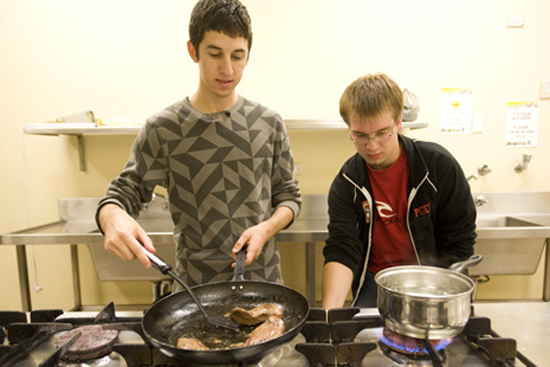BU Abroad: Hoppy Meals
Meet Australia’s favorite low-fat marsupial
Get the Flash Player to see this media.
In the video above, Lyle Moran (COM’10) talks about his love of kangaroo meat.
Which national symbol of Australia hops around, has a pouch — and is 98 percent fat-free? Correct. And some Aussies will tell you that kangaroos are as delicious as they are cute. While down under last spring in BU’s Sydney Internship Program, Lyle Moran’s appreciation for kangaroo meat blossomed into a weekly routine of feeding his friends and proselytizing about the marsupial’s culinary merits. And, oh yes, price: at $2 a pound, kangaroo is a good fit for a student budget.
“I consistently got it at least once a week,” says Moran (COM’10), a print journalism major. “Sometimes I got it twice. I just figured I wasn’t going to have kangaroo back in the U.S. and that was the time to get it in.”
Some of Moran’s favorite variations on the steak-like meat — kangaroo must be seasoned well to overcome its gaminess — include filets, kebabs, and stir-fries.
“I miss kangaroo very much,” says Moran of the sad inevitability of returning stateside. “Just walking down the grocery store aisles isn’t really the same knowing there isn’t kangaroo at the end of the aisle anymore.”
For better or worse, since he returned to the United States, Moran’s interest in cooking for friends has waned.
“Eating kangaroo was emblematic of my desire in Australia of trying new things, which carried over to the food realm,” says Moran. “Now I’m definitely more reserved in the kitchen. I don’t have that unique delicacy to work with. That excitement is gone.”
“I make breaded chicken, but is that kangaroo? Definitely not,” he says. “If my journalism career does not pan out, I plan on starting a kangaroo shipping business.”
Alan Wong can be reached at alanwong@bu.edu.
Additional videography by Chris Palmer.
Read more at BU Abroad.
Have a study abroad story to share? Let us know in the comments below.
This Series
Also in
BU Abroad
-
March 20, 2017
Cuban Culture Shapes a Spring Break Trip
-
July 14, 2016
Sargent Students Witness Public Health in Thailand
-
September 10, 2015
Study Abroad Zanzibar: Swahili and Spice

Comments & Discussion
Boston University moderates comments to facilitate an informed, substantive, civil conversation. Abusive, profane, self-promotional, misleading, incoherent or off-topic comments will be rejected. Moderators are staffed during regular business hours (EST) and can only accept comments written in English. Statistics or facts must include a citation or a link to the citation.